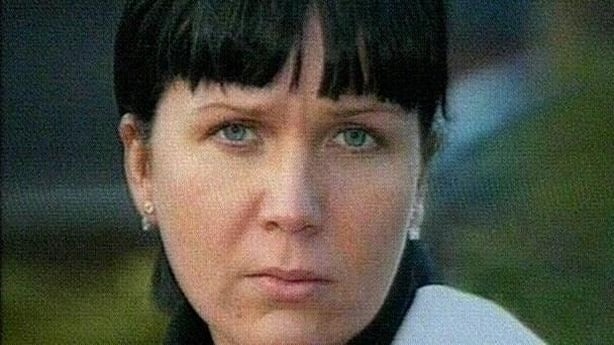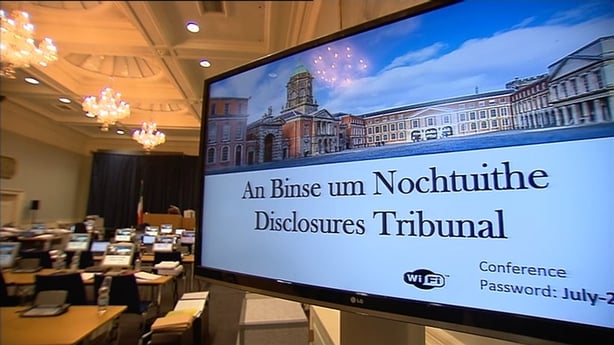The Disclosures Tribunal has found that senior garda officers did not target or discredit a garda sergeant after he alleged there had been a systems failure in the organisation leading to the murder of a young woman in 2006.
In the tribunal's sixth and final report, Mr Justice Sean Ryan found that the concerns that motivated retired Sergeant William Hughes were genuine and real, and that his mental health issues were genuine.
He found the sergeant had a prolonged difficult experience over more than six years from the murder of 28-year-old Baiba Saulite in November 2006 until his retirement on medical grounds in February 2013.
But the judge reached the conclusion that senior officers did not target or discredit Sergeant Hughes because he had made protected disclosures alleging wrongdoing in the force.
Mr Justice Ryan said in every case the tribunal was satisfied there was no sufficient or realistic basis for inferring a connection between the conduct Sergeant Hughes complained of and any protected disclosure by him.
The tribunal heard 16 days of evidence in public last year in relation to the allegations made by Sergeant Hughes and 29,000 documents were provided to it.
Baiba Saulite was shot dead at the door of her home in Swords, Co Dublin on 19 November 2006. She was originally from Latvia and was a mother of two young children.
At the time of her killing, her estranged partner, called 'Mr A' by the tribunal, was awaiting sentence on charges of abducting their children from the State.
The children had been taken from Ireland in December 2004 and returned in September 2005.

After Mr A pleaded guilty, Ms Saulite prepared a victim impact statement for the sentencing hearing, saying she was very scared for her life. She was shot dead five days later.
Sergeant Hughes was one of the gardaí investigating the abduction of the children.
He alleged there had been a systems failure in relation to the investigations surrounding the murder.
He claimed there had been a failure to coordinate all the information and investigations prior to her death, including an arson attempt on the home of her solicitor, John Hennessy, an arson attempt on her own car and intelligence indicating a threat to her solicitor's life.
Sergeant Hughes claimed that information about the criminal connections of Mr A was in garda possession prior to the murder but was not given to the gardaí who had been dealing with the abduction case.
He claimed if this information had been passed on, it was possible the murder would not have happened.
He said when he raised his concerns, he was scapegoated and subjected to a horrendous cycle of intimidation, bullying and harassment at the hands of garda management.
In 2007, a disciplinary investigation was carried out by gardai into an allegation that Sergeant Hughes knew there was a real and immediate risk to Ms Saulite's life and failed to take measures as a result.
The tribunal heard the sergeant had not read her 12-page victim impact statement in full and did not see Ms Saulite's expression of her fears until after her murder.
The investigation exonerated him and found there was no breach of discipline.
It found there was nothing to indicate her life was at risk.
And it found that even if the sergeant had read Ms Saulite's victim impact report, it was unlikely the contents could be interpreted as a real and immediate threat to her life.
However, Sergeant Hughes claimed this disciplinary procedure was the first direct action in what he claimed was his targeting.
And he also complained that a press release issued by gardaí about the murder in November 2006, contained a number of falsehoods and omissions.

The tribunal also investigated allegations by the sergeant that An Garda Síochána failed to carry out an investigation into the work-related stress he was suffering from.
An investigation into Sergeant Hughes' claims by the force in 2009 and 2010 found his allegations were without foundation.
Assistant Garda Commissioner Michael Feehan told the tribunal the claims were properly investigated, and no evidence was found to support the assertion that gardaí were aware of any threat to Ms Saulite before she was murdered.
No one was ever convicted of the murder. Mr A was already in prison at the time, serving a four-year sentence for his part in a plan to export stolen cars to the Middle East.
He was given a further two-year sentence for the abduction of the children and left Ireland on his release from prison.
In his conclusions, Mr Justice Ryan found the decision to direct a fact finding report in relation to Ms Saulite's victim impact statement was reasonable and justified.
He said it could not be considered as targeting or discrediting of Sergeant Hughes.
And he found the subsequent disciplinary investigation which exonerated Sergeant Hughes was justified.
Judge Ryan said the tribunal's investigation of the issues around his sick leave did not reveal any targeting or discrediting of the sergeant and there was no evidence of a connection between any complaints made by him and the actions of officers who dealt with these issues.
The judge also rejected Sergeant Hughes' criticisms of the garda investigation into his complaints in 2009 and 2010.
He said the tribunal was satisfied the investigation was "an exceptionally thorough body of work" and was unable to find any legitimate basis on which it could be condemned.
The tribunal made some recommendations in relation to how the force deals with work-related stress.
It also found that internal garda investigations were in need of reform, with Judge Ryan stating it was important that investigations be brought to expeditious conclusions.
He said long delays were unsatisfactory, potentially prejudicial and distressing for the people concerned.
He said one way to improve the situation would be to reduce the burden of routine work that investigators have to contend with as well as the investigation.
He said whether there should be a separate internal affairs division in the force to investigate criminal and disciplinary matters was a matter of policy for garda authorities.
The Disclosures Tribunal was set up in February 2017 to inquire into allegations made by garda whistleblowers.
Its first chairperson was Mr Justice Peter Charleton, and its first report dealt with allegations made by Sergeant Maurice McCabe.







